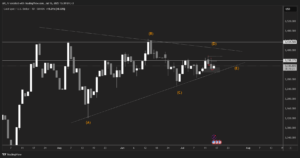The US Treasury Secretary promised more measures to secure bank deposits and expects inflation to decline.
US Treasury Secretary Janet Yellen said Thursday, March 23, that she is ready to take further measures to secure US bank deposits amid turmoil in the US banking system.
“We used, as I said, important tools to work quickly to prevent transmission. And these are tools we can use again,” Yellen added in a prepared speech to the House Appropriations Subcommittee.
And she added, “The strong measures that we have taken ensure that Americans’ deposits are safe, and certainly, we will be ready to take additional measures if necessary.”
Also, in the same session, the Minister spoke about inflation, which she said may eventually decrease because supply chain pressures are shrinking and shipping costs are falling.
She also said that a debt default would undermine the dollar’s status as the global reserve currency and that failure to raise the debt ceiling would lead to a recession or worse.
The US Regional Banks Index records its lowest close in 27 months, despite assurances from the Treasury Secretary.
US indices closed marginally higher in Thursday’s session, after losing most of their early gains, despite assurances from the US Treasury Secretary that additional measures will be taken to keep Americans’ deposits safe.
The US indices recorded sharp declines by the end of Wednesday’s session, following the US Federal Reserve’s decision to raise interest rates by 25 basis points amid expectations of another additional increase this year.
The US regional banks index fell by 3%, its lowest close in 27 months after First Republic Bank stock fell by more than 6% to close near its lowest level ever.
Janet Yellen, in her testimony before the US Congress, ruled out comprehensive protection for all deposits at a time when central banks around the world continue to raise interest rates and put more pressure on the banking sector.
The Dow Jones index closed up by 0.2%, or 75 points, after losing most of its early gains, which amounted to nearly 500 points.
The technology index jumped by 2%, supported by the rise in Intel and Microsoft shares by 3.2% and 2%, respectively.
The Nasdaq Composite Index rose by about 1% in Thursday’s session to close at 11,787 points. The S&P 500 index rose by 0.3% to close at 3,948 points but stayed above the 200-day moving average.
Shares in Block, which Jack Dorsey heads, fell about 15% to its lowest close in 3 months after the Hindenburg Corporation issued a report accusing the company’s payments application of facilitating fraud and lacking strong compliance controls.
The dollar declined as traders evaluated the path of US interest
The dollar settled near its lowest level in 7 weeks in trading Friday, March 24, as concern about banks kept investors cautious and dealers assessed the possibility that the Federal Reserve would stop raising interest rates.
The dollar index, which measures the performance of the US currency against six major currencies, fell 0.097% to 102.48 points, remaining slightly above its lowest level in 7 weeks at 101.91, which it touched yesterday, Thursday.
The index achieved slight gains yesterday, Thursday, it’s first in 6 trading days.
The Fed on Wednesday raised interest rates by 25 basis points as expected but was cautious about further hikes due to banking turmoil, even as Chairman Jerome Powell kept the door open for another rate hike if needed.
US Treasury Secretary Janet Yellen confirmed on Thursday that she is ready to take further measures to ensure Americans’ bank deposits remain safe to calm investors.
The yen rose 0.5% to 130.16 per dollar after touching a 6-week high of 130.055 earlier in the session. The British pound settled at $1.2285 after touching a 7-week high of $1.2341 yesterday, Thursday, in volatile transactions. The euro rose 0.03% at $1.0833, below its 7-week high of $1.0930, which it touched on Thursday. Investors will focus on March PMI data from the Eurozone, Germany, France, and Britain, due out later in the day to assess the state of the European economy. The Australian dollar rose 0.07% to 0.669 against the dollar, while the New Zealand dollar fell 0.14% to 0.624 against the dollar.
European stocks fell for the second day in a row, trimming their weekly gains.
European stocks fell in early trading on Friday, trimming their weekly gains, with continued concerns about the stability of the banking sector and the impact of raising interest rates on economic growth.
Moody’s Investors Service warned that there are risks that the US banking turmoil cannot be contained despite swift action by regulators and policymakers, resulting in greater than expected financial and economic damage.
The Stoxx Europe 600 fell 0.77% to 442 points at 08:06 GMT, led by the banking sector, despite reassurances by policymakers that the system is stable after recent volatility.
The British FTSE 100 index fell by 0.79% at 7440 points, the German DAX fell by 0.86% to 15080 points, and the French CAC fell by 0.96% at 7070 points.
Today’s official data showed that British retail sales in February unexpectedly rebounded by 1.2% compared to the previous month, and sales volumes returned to the pre-epidemic level, with cash-strapped British families preferring to buy food from supermarkets than eating out.
Japanese stocks closed lower as the yen rose and concerns about the financial system.
Japanese stocks closed lower on Friday, March 24, as a stronger yen raised concerns about slumping domestic corporate earnings, while investors continued to worry about a broader banking crisis.
The Nikkei index decreased by 0.13% to close at 27,385.25 points, down by 0.19% during the week.
The broader Topix index fell 0.10% to 1955.32 points, recording a weekly loss of 0.2%.
The yen touched a 6-week high against the dollar on Friday as traders continued to assess the Federal Reserve’s hints of pausing interest rate hikes.
Risk appetite took a hit after the collapse of Silicon Valley, and liquidity problems at Swiss bank Credit Suisse raised concerns about a global financial crisis.
Fast Retailing, which owns Uniqlo stores, fell by 1.01%, which pushed the Nikkei index down the most.
Shares of oil exploration companies fell 1.27%, the worst performer among 33 sub-indices on the Tokyo Stock Exchange, after the drop in oil prices.
Financial companies recorded poor performance, with the banking index declining by 0.77% and the insurance index falling by 0.77%.
Tokio Marine Insurance Holding Company recorded the most significant decline among the top 30 major companies listed on the Topix index, down 1.19%, followed by Mitsubishi UFJ Group, down 1.10%.
Among the stocks listed on the Nikkei index, 69 rose, 149 fell, while seven remained stable.
Oil is falling after America announced a slowdown in refilling its strategic reserves.
Oil prices fell on Friday, March 24, extending the previous day’s losses, due to fears of an oversupply after US Energy Secretary Jennifer Granholm said it could take years to refill the US strategic oil reserves.
Brent crude futures fell 48 cents, or 0.6%, to $75.43 a barrel, and US crude futures fell 52 cents, or 0.7%, to $69.44 a barrel.
The two benchmarks are still on track to record weekly gains ranging between 3 and 4%, recovering from the most significant weekly decline in months last week due to the banking sector crisis and fears of a possible recession.
“Granholm” told members of the House of Representatives on Thursday that it will be challenging to take advantage of low oil prices this year.
Sales directed by President Joe Biden last year pushed oil stocks to their lowest since 1983.
Disclaimer: This article is not investment advice or an investment recommendation and should not be considered as such. The information above is not an invitation to trade and it does not guarantee or predict future performance. The investor is solely responsible for the risk of their decisions. The analysis and commentary presented do not include any consideration of your personal investment objectives, financial circumstances, or needs.





